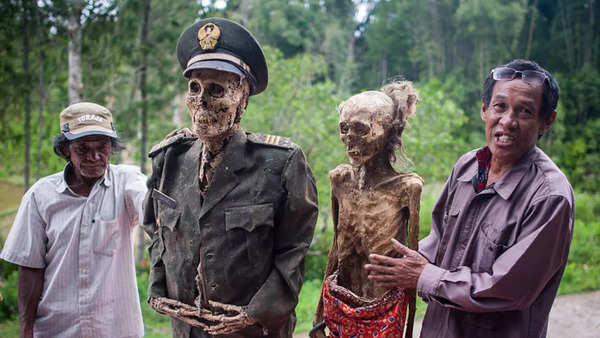The Toraja’s animistic beliefs, which hold that every natural thing in the universe has a soul, blur the line between the living and the dead.Death is not seen as a final departure but as a prolonged process, a journey that the deceased embarks upon. The dead are referred to as “to makula’,” meaning “a sick person,” and are treated with the same respect and care as the living.

Ma’nene or the “The Ceremony of Cleaning Corpses” is followed by Toraja people due to their animistic beliefs. Source: Getty Images
Every August, families gather for the ritual of Ma’nene, which coincides with the end of the harvest season. The bodies are carefully removed from their crypts and given a thorough cleaning to remove any bugs or dirt. They are then dressed in fresh garments, and their tombs are tidied up. This act of grooming and redressing the mummified bodies is not only a gesture of love and respect but also a communal event that reinforces family bonds and ancestral connections.
The ritual is as much about the living as it is about the dead. It provides a time for families to come together, to remember their ancestors, and to pass on stories and traditions to the younger generations. The Ma’nene ceremony is a vivid expression of the Toraja’s cultural identity and their profound relationship with their ancestors.
The practice has attracted global attention, drawing tourists to witness the extraordinary sight of the Torajan people embracing their deceased loved ones. While some may find the ritual macabre, for the Toraja, it is a beautiful affirmation of life and death’s interconnectedness.
The Ma’nene ritual also serves a practical purpose. The Toraja live in a mountainous region where the soil can be rocky and unstable. By periodically exhuming the bodies, the families can ensure that their loved ones’ remains are preserved and protected from the elements.
Despite its ancient origins, the ritual has adapted to modern times. The Toraja have embraced the interest in their culture, and Ma’nene has become an opportunity to share their traditions with the wider world. However, they remain vigilant in preserving the dignity and solemnity of the ceremony, ensuring that it remains a respectful homage to their ancestors.
The Ma’nene ritual of the Toraja people is a poignant reminder of the lasting bonds between the living and the dead. It challenges our conventional views on death and bereavement, offering a different perspective on how we can honor and remember those who have passed away.
Gaza’s grim discovery: New mass grave unveiled; IDF executions or raid victims?

